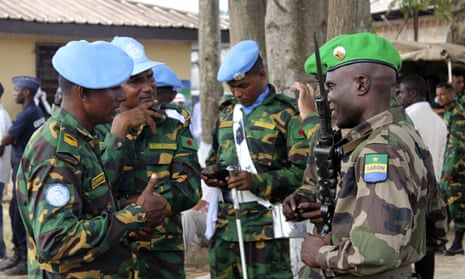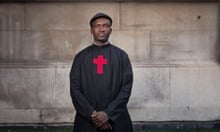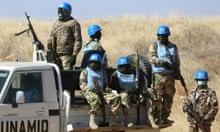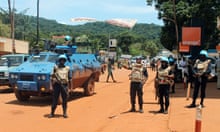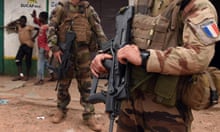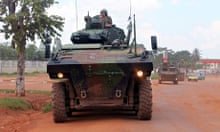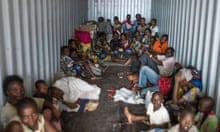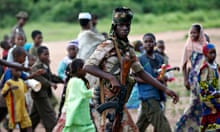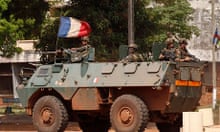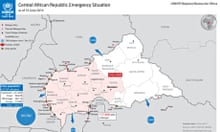The UN has taken over peacekeeping operations in Central African Republic (CAR) from a regional African force but human rights groups warn that a mere change in headgear – from green berets to blue helmets – will do little to stem the bloodshed.
More than 5,000 people have died in CAR since December, in the wake of a coup that plunged the country into chaos.
In a rainswept “rehatting” ceremony at Bangui airport on Monday, about 1,800 additional peacekeepers and police joined the mission as the UN took control, along with 4,800 African troops and 1,000 international police from the previous contingent. But the newly combined force is still only about two-thirds of what was authorised by the UN security council in April.
And not for the first time in the history of UN peacekeeping, it also comes with a cumbersome new acronym: Minusca, which in French stands for the United Nations Multidimensional Integrated Stabilisation Mission in Central African Republic.
Herve Ladsous, the head of the UN’s peacekeeping operations, delivered a symbolic blue beret to the Cameroonian general heading what was called Misca, Martin Chomu Tumenta, who became commander of the Minusca force. There are also 2,000 French troops in CAR who will not be part of the UN force.
Catherine Samba-Panza, the country’s embattled interim president, welcomed the transition, saying: “Today’s events mark a clear shift – a new stage in the stabilisation of the country after the cycles of barbaric and aimless violence of the last three decades.”
Ban Ki-moon, the UN secretary general, said: “This transfer of authority marks the successful completion of Misca’s mandate and the beginning of Minusca’s military and police action.”
He urged rival sides in CAR “to put an immediate end to the violence” and enable a political transition to stable and democratic rule.
The new reinforcements have come from Pakistan, Sri Lanka, Indonesia, Morocco and Bangladesh to join peacekeepers from other countries in central Africa. Minusca will eventually be boosted to 12,000 soldiers and police officers but not until early next year, to the frustration of groups including Amnesty International.
Steve Cockburn, its deputy regional director for west and central Africa, said: “The switch from African Union to UN peacekeepers must be more than a cosmetic change: swapping green berets for blue helmets. Instead it must serve as a fresh start for the peacekeeping operation in CAR.
“The gap between the number of peacekeepers promised and the number deployed must be urgently filled. Only once the full force is on the ground, undertaking patrols and protecting CAR’s civilian population, can the UN properly fulfil its protection mandate.”
Amnesty has documented serious human rights violations, including unlawful killings, committed by some AU troops. Cockburn added: “All alleged incidents involving AU troops must be investigated and the flawed vetting system must be improved to ensure that there is no place in the UN mission for peacekeepers suspected of committing human rights violations.”
In a sign of relative calm in the capital, if not elsewhere in the country, the US embassy in Bangui reopened on Monday after closing down late in 2012. The new American ambassador, David Brown, has already been serving as senior adviser to CAR since August last year. The US secretary of state, John Kerry, said progress has been made at putting the nation on “a path toward peace and stability”.
The country sank into conflict after a coup in March last year by a largely Muslim rebel coalition, the Seleka, which overthrew president François Bozizé and made Michel Djotodia head of state. Influential foreign leaders forced Djotodia to step down in January after he proved incapable of preventing widespread atrocities by rogue Seleka fighters.
Communities from CAR’s mainly Christian majority responded by setting up vigilante forces known as the anti-balaka (anti-machete) to exact revenge, mostly targeting Muslim civilians whom they accused of backing Seleka.
At least 5,204 people have been killed since the sectarian violence erupted last December, according to a tally compiled by the AP. The figure is based on a count of bodies and numbers gathered from survivors, priests, imams and aid workers in more than 50 of the hardest-hit communities. More than a quarter of CAR’s population of 4.8 million has been displaced by the strife, while only one Muslim district remains in Bangui.
Lewis Mudge, Africa researcher at Human Rights Watch, said: “Civilians are being killed by all sides at an alarming rate and people are desperate for protection. There is no time to lose. The new UN mission urgently needs to get more troops into eastern and central areas and take bold steps to protect civilians from these brutal attacks.”
